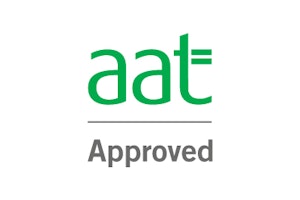AAT Advanced Diploma in Accounting
About this course
The AAT Diploma in Accounting covers a range of accounting and finance skills in four mandatory units. This AAT (Association of Accounting Technicians) advanced level course is a mid-level accounting qualification, ideal for anyone who is looking to advance their existing knowledge of accounting.
What you will study
Business Awareness
This unit provides students with an understanding of the business, its environment and the influence that this has on an organisation’s structure, the role of its accounting function and its performance. Students will examine the purposes and types of businesses that exist, and the rights and responsibilities of key stakeholders. Students will learn what the micro- and macro-economic environments are and the impact and influence that changes in these environments can have on performance and decisions. This will include an understanding of the basic business law relating to the preparation of financial statements for different types of entities. Students will learn about the concepts of risk, types of risk and risk management for a business. Students will understand the importance of professional ethics and ethical management, and how the finance function interacts with other key business functions to enhance operational efficiency. Students will learn the core aspects of the ethical code for accountants and will apply these principles to analyse and judge ethical situations which could arise in the workplace. They will also understand how acting ethically stems from core personal and organisational values, as well as understanding the legal and regulatory framework for anti-money laundering.
Financial Accounting: Preparing Financial Statements
This unit provides students with the skills required to produce statements of profit or loss and statements of financial position for sole traders and partnerships using a trial balance. In employment, students may be required to prepare a portion of, or all, the final accounts and this unit will give them the theoretical knowledge needed to complete that task. It will also allow them to understand how final accounts have been produced, either manually or automatically through use of accounting software.
Management Accounting Techniques
This unit provides students with the knowledge and skills needed to understand the role of management accounting in an organisation, and how organisations use such information to aid decision making.
Students will learn the principles that underpin management accounting methodology and techniques, how costs are handled in organisations, and why organisations treat costs in different ways. Students will be able to recognise different approaches to management accounting and provide informed and reasoned judgements to guide management. They will also learn how to apply these principles and appreciate why effective management accounting is crucial to any organisation.
Tax Processes for Business
This unit provides students with the knowledge and skills needed to understand the role of management accounting in an organisation, and how organisations use such information to aid decision making. Students will learn the principles that underpin management accounting methodology and techniques, how costs are handled in organisations, and why organisations treat costs in different ways. Students will be able to recognise different approaches to management accounting and provide informed and reasoned judgements to guide management. They will also learn how to apply these principles and appreciate why effective management accounting is crucial to any organisation.
For VAT, students will understand the registration and deregistration rules, including signing up for Making Tax Digital (MTD), and the rules relating to specialist VAT schemes. Students will be able to recognise different types of supplies and calculate VAT correctly, understanding the importance of the rules relating to the recovery of input VAT and the sanctions and penalties for inaccuracies, omissions and failure to make submissions and payments within the correct timescales. Students will be able to verify the accuracy of calculations, invoices and tax points, and will learn about the correction of errors. When learning about the content of the VAT return, students will understand how to apply special rules when goods and services are imported and exported out of the UK and the European Union (EU), and how to extract the appropriate data to complete VAT returns.
In relation to payroll, students will understand the processes for businesses involved in calculating pay and deductions and the content of documents and reports produced on software, along with the timescales for submission and payment.
Entry requirements
Successful completion of AAT Level 2 or Level 2 Bookkeeping with commercial experience. You will need to attend an interview and pass an AAT Skills assessment. There is an AAT membership fee of approximately £240 which needs to be paid directly to AAT
Teaching and assessment
The teaching assessments for this course is four computer-based assessments.
Important points
- The College welcomes contact with parents/guardians of students who are under 18.
- Additional support is available for students with learning difficulties and disabilities.
- Cardiff and Vale College is committed to inclusion and values diversity. We are determined to promote equality of opportunity and to treat everyone fairly and with respect.
- Cardiff and Vale College reserves the right to make changes to this course without prior notice.
- Course fees are subject to change. Your fee will be confirmed prior to enrolment.
- All courses are accurate at the time of upload or print.
- Courses can only run if there are sufficient numbers.
- Please note, if you choose three or more course choices, then you may be referred for a careers appointment first. This does not apply to A Level or GCSE choices.
Start date
End date
Time of day
Full Time
Course code
Qualification
